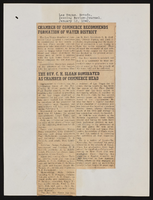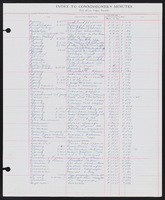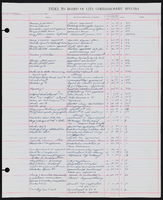Search the Special Collections and Archives Portal
Search Results
Irma Varela oral history interviews
Identifier
Abstract
Oral history interviews with Irma Varela conducted by Barbara Tabach on December 04, 2018 and March 05, 2019 for the Latinx Voices of Southern Nevada Oral History Project. In these interviews, Varela talks about her upbringing in Zacatecas, Mexico, her move to Las Vegas, Nevada in 1989, and how religion has affected her life. She also describes her work as the Cultural Program Supervisor at Winchester Community Center, and her career in preserving Hispanic cultural traditions in Las Vegas. Varela talks about being an active leader in local Las Vegas organizations and events such as the Mexico Vivo Dancing Company, Dia de los Muertos (Day of the Dead) celebrations, and the International Food and Folklife Festival.
Archival Collection
Junior Fonotisatele oral history interview
Identifier
Abstract
Oral history interview with Junior Fonotisatele conducted by Cecilia Winchell and Stefani Evans on November 10, 2021 for Reflections: The Las Vegas Asian American and Pacific Islander Oral History Project. Junior discusses his Samoan background and the importance of strong family values. He talks about his early years in Utah and California before moving to Las Vegas where he attended and graduated from the University of Nevada, Las Vegas. Junior shares his employment history as a bodyguard for Floyd Mayweather, an entrepreneur of a clothing brand, and an investor into a range of ventures including security, solar energy, and mental health. He concludes with a discussion of Samoan cultural celebrations, his religion, and the significance of his tattoos.
Archival Collection
Lawrence Weekly oral history interview
Identifier
Abstract
Oral history interview with Lawrence Weekly conducted by Elsha Harris Yolanda on November 19, 2014 for the African Americans in Las Vegas: a Collaborative Oral History Project. In this interview, Weekly discusses his personal history and growing up in Las Vegas, Nevada. He talks about the importance of religion in his upbringing and his parent’s employment in the hospitality industry in Las Vegas. Weekly describes the racial discrimination he experienced in education, attending the College of Southern Nevada and later transferring to Grambling State University in Louisiana. Later, Weekly discusses his rationale for attending a historically Black college, his career as a Clark County Commissioner, and the reopening of F Street. Lastly, Weekly talks about the lack of progress in race relations across the United States.
Archival Collection
Morse Arberry oral history interview
Identifier
Abstract
Oral history interview with Morse Arberry conducted by Brittany Thompson and Andrew Thomas on November 20, 2015 for the African Americans in Las Vegas: a Collaborative Oral History Project. In this interview, Arberry discusses his personal history and moving to Las Vegas, Nevada in 1958. He talks about his father's employment at the Nevada Test Site and the issues of segregation at the time. Arberry recalls attending the Westside School and talks about school integration. He then describes his career in legislation, working on bills to improve the integration process, and the impact that the University of Nevada, Las Vegas (UNLV) had on the level of education among adults in the community. Lastly, Arberry discusses the West Las Vegas community, the significance that religion had on African Americans, and the increase of law enforcement in the area.
Archival Collection

Hildred Meidell interview, February 27, 1979: transcript
Date
Archival Collection
Description
On February 27, 1979, collector Greg Abbott interviewed Hildred Meidell (b. March 17, 1900 in Webb City, Missouri) about her time living in Las Vegas, Nevada. Meidell covers a range of topics, from her and her husband’s time as tourists in the city and their subsequent retirement to Las Vegas from Los Angeles, California. Meidell describes the Las Vegas Strip, the interstate and highway conditions between Los Angeles and Las Vegas, as well as their numerous visits to Hoover Dam (Boulder Dam). Moreover, she speaks about the changing layout of the city, the increase in shopping centers and department stores, and the clothing stores inside of hotels. Lastly, Meidell talks about the prominence of churches in local communities, the atomic testing program and the structural damages these tests caused in her neighborhood, and the influence of the railroad and passenger train on the town.
Text

Transcript of interview with Ed Fleming by Mark Lucas, February 8, 1977
Date
Archival Collection
Description
On February 8, 1977, Mark Lucas interviewed Edmund “Ed” Fleming (born 1915 in Virginia, Minnesota) about his experience in Southern Nevada. Fleming first talks about his moves to and from Nevada before describing the mining practices within the small towns in Southern Nevada. He also talks about his experience as a teacher in Pahrump and Goodsprings and his eventual move to Las Vegas, where he continued in the educational field. Fleming also talks about religion, transportation, funding for education, inflation, and cultural arts as they all relate to Las Vegas.
Text




